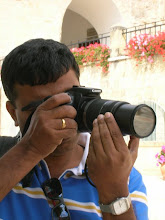peter_asirvatham@yahoo.com
"Sorry Sir, we do not supply our guest rooms with newspapers." came the answer when I called the reception for The Jerusalem Post. I had been a reader of the online paper, and I thought what a good idea it'd be to collect The Jerusalem Post at Jerusalem, as a souvenir as well as read it. It was end of Day Five (30.04.2008) of our pilgrimage and we had just checked into The Jerusalem Gate Hotel, west Jerusalem. The room did not have any newspaper.
"Would The JPost be available at the lobby?" I tried my luck.
"No Sir" and the line went dead.
I dialed Binu's room, "Binu, would you like to go out for a walk with me?" Having some time on hand before dinner, I thought I'd step out for a walk. Before leaving Chennai, I had planned to purchase a book called "Israel through my lens" in Jerusalem, now I added The Jerusalem Post to that list.
"Sure, in five minutes." Binu replied. Binu and I had stepped out for a walk the previous evening as well, at Bethlehem, when I went looking for a local English Palestinian Newspaper. We had found none, what I bought as a souvenir was an English newspaper printed in Egypt dated a few days earlier.
I turned on the TV as I waited for Binu. Israel was getting ready for her 60th Independence Day celebrations a few days away - 14th May, and a TV commercial celebrating the event was playing on TV. I cursed myself for not having the camcorder with me to record it. Perhaps I'll find it in Youtube later, I thought. I've not been lucky till date.
"Is there a Newsstand or a Bookstore nearby, where I can buy The Jerusalem Post?" I asked the receptionist when Binu and I reached the lobby. "Down by the bus stand, Sir" came the reply. Before I could ask where the bus stand is, the man was on the phone answering another guest.
It was nippy outside, we pulled our jackets close and thrust our hands into our pockets. We generally loitered around, expecting to find the bus stand. Almost all the buildings we came across were built with stone bricks. The roads and pavements were clean, no litter anywhere. Traffic on the roads moved smoothly, not one motorist used the horn! Motorists slowed down or stopped to allow us cross the road where there was no signal, no one cursed us!
Among the people we saw on the roads, two distinctive groups stood out - Haredim and soldiers. Haredim are ultra-orthodox Jews, conspicuous in their black coats and hats. The soldiers were conspicuous too, in olive green uniforms, with their berets tucked into the left shoulder flaps and with their machine guns hung casually from the shoulders. The soldiers were a mixture of both sexes, they were off-duty, but still alert.
Not finding the bus stand nor the bookstore we returned to our hotel. We continued our search the next evening, after taking directions from the reception. We found a store that had The Jerusalem Post. Some more walking and we found the bus stand. Next to the bus stand was a shopping mall, outside of which were barricades, and everyone entering the mall had to walk through metal detector frames and security check. The people waiting for their turn to enter were patient, the only clue to their impatience, if any, was the number of cigarette butts littering the floor. Israel takes its security seriously, though suicide bombings by Palestinian terrorists had come down in Jerusalem, thanks to the "Wall of Separation" - a security barrier that Israel had built in some parts of The West Bank to monitor Palestinians' movement.
Inside the mall bright neon lights on shop-fronts attracted customers to step inside. A great many people were moving around everywhere, including soldiers, but minus Haredim. We window-shopped around the mall. I was happy to see a Canon 400D camera (same as mine) in one of the store windows. And yes we finally found a book store.
"Have you got the book "Israel through my lens," by David Rubinger"? I asked the man at the counter. He directed me to two store girls inside, I repeated my question to them. The girls blinked. "It's a coffee table book." I explained, "David Rubinger was a photographer with The Jerusalem Post and he covered the Six Day War of 1967." At the mention of the Six Day War, one of the girls smiled, went over to a book shelf and returned with a book. I was so happy and gave the girl a big thank you smile.
But soon my happiness turned to disappointment - the book was in Hebrew! To buy, or not to buy was the question that plagued my mind. The book would certainly make a great souvenir, but not a practical one.
Binu and I returned to the hotel, empty handed, save The Jerusalem Post, tucked under my arm.
Since my return from Israel, I've found the book on Indian online book stores. On more than a couple of occasions, I've been tempted to make the purchase. But my other mind has said, "You might be lucky in your next visit to Israel!"
God willing.
A photo-album of "Israel through my lens" - CLICK HERE
